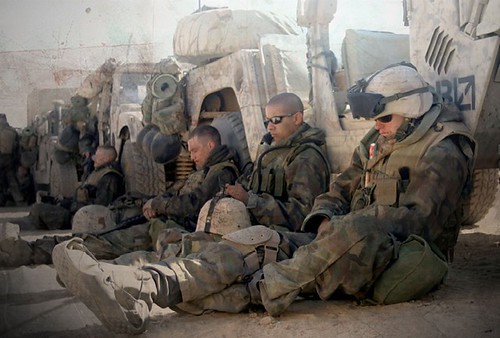Generation Kill has recieved rave reviews. The mini-series, which aired from July to August on HBO, is based on the experiences of Rolling Stone journalist Evan Wright, when he was embedded with the 1st infantry division of the Marines in 2003. It has been lauded as one of the most realistic portrayals of the Iraq War by New York Times critics. But what do war veterans from Philly think?
“For the first time I actually lost myself in a TV show because it was so accurate,” Damien Townsville said.
Townsville, 25, is an undeclared freshman at Temple. He served in Iraq for eight months as a light-wheel vehicle mechanic and military police volunteer for the Army.

“It’s not like HBO was trying to tell a story – at least it didn’t seem like it to me,” Townsville said. “It just seemed like they actually went down to the battleground in Iraq and saw what the platoon was doing.”
Generation Kill portrays the invasion of Iraq as a chaotic, mismanaged and poorly communicated endeavor, but it also shows the patience and professionalism of the troops.
In one episode, a missile obliterates a village filled with women and children before ground troops can assess its threat level. In another, a character loses his Marine Corps helmet and can’t get a replacement, so he dons a motorcycle helmet and eventually a “hajji helmet” worn by the Iraqi Republican Guard.
Will Tromboli can relate. The Allentown native, 26, served as an Army corporal in Iraq for three years.
“If someone’s equipment would malfunction, like an M-16, they’d spring it so that it would fire but it wouldn’t really work because they didn’t have the right supplies to fix it,” Tromboli said.
Townsville remembered making improvised armor for the trucks and being issued nuclear, biological and chemical suits that dissolved when they were tested with basic nerve gas compounds.
Communication with the locals was difficult, he said, because there was only one translator for the 40 units in his base.
These themes all echo throughout Generation Kill, but some veterans had very different experiences.
Jeremy Gilbert, a 21-year-old ROTC cadet at Temple, was stationed in Iraq as an Army sergeant in 2006. He said he always had a translator with him during missions, even when he was in small groups. His unit was so well stocked with supplies that they gave the extra ammunition to needier bases.
Generation Kill also portrays the Marines helping locals. One episode shows them escorting more than 100 refugees through a dangerous area of the country. The real-life veterans had similar stories.
“There was a village just outside of the airport that came under attack from Saddam’s guards and we set up camp for them,” Gilbert said. “We’d protect them, supply them with food and water, and generate electricity to basically sustain the village so it could survive.”
The first episode of Generation Kill features a soldier who ridicules the cards that elementary school kids send them. Townsville said that while some of soldiers blew off cards from children in school, it was always a morale booster for him, especially during the holidays.
Upon his return to the United States, Townsville gathered the addresses of soldiers who were serving in Iraq and gave them to students in his old middle school, so they would receive letters.
The psychological toll of the war on the Marines is hinted at several times throughout the mini-series. In one scene, a few of the soldiers admit that they feel emotionless after killing several insurgents in a gunfight.
Townsville said the adrenaline rush and war mentality made killing seem regular at the time, but the repercussions sneaked up on him later.
“I’m not the same person from when I went in to when I came out, and I’m not talking about maturity. I’m talking about my mind,” he said. “I don’t feel anymore.”
While many agree that Generation Kill accurately portrays the war, the series left something out: it doesn’t show its soldiers return to the United States.
Townsville said he didn’t receive proper psychological services when he returned home. He had flashbacks while driving through traffic and often canceled and rescheduled his psychiatric appointments.
Gilbert had a more optimistic outlook on the future and volunteered to return to active duty in Iraq. By the time his peers enjoy their first legal drinks, Gilbert hopes to be a platoon leader in charge of 40 soldiers.
“This is what I’m made for,” Gilbert said. “It’s not that I want more, I feel I can make a difference.”
In the closing scene of Generation Kill, the Marines, who suffered no casualties gather around a television in their base. They view personal videos of Iraq as they wait to return home. At first, they hoot and holler like a football team watching the tape of a win, but as images of death and destruction flash on the screen periodically, they quiet down and walk away one by one.
It could easily be a metaphor for the public opinion of the Iraq War, and was one of the few creative liberties the producers used in the series to make a subtle political statement.
“Slowly but surely with a series like Generation Kill, you are seeing what’s going on,” Townsville said. “But you can’t experience what’s going on unless you’ve been there.”
Jimmy Viola can be reached at jimmy.viola@temple.edu.



It could easily be a metaphor for the public opinion of the Iraq War ,and was one of the few creative liberties the producers used in the series to make a subtle political statement. The killing mission of iraq war mentality made killing seem regular at the time.